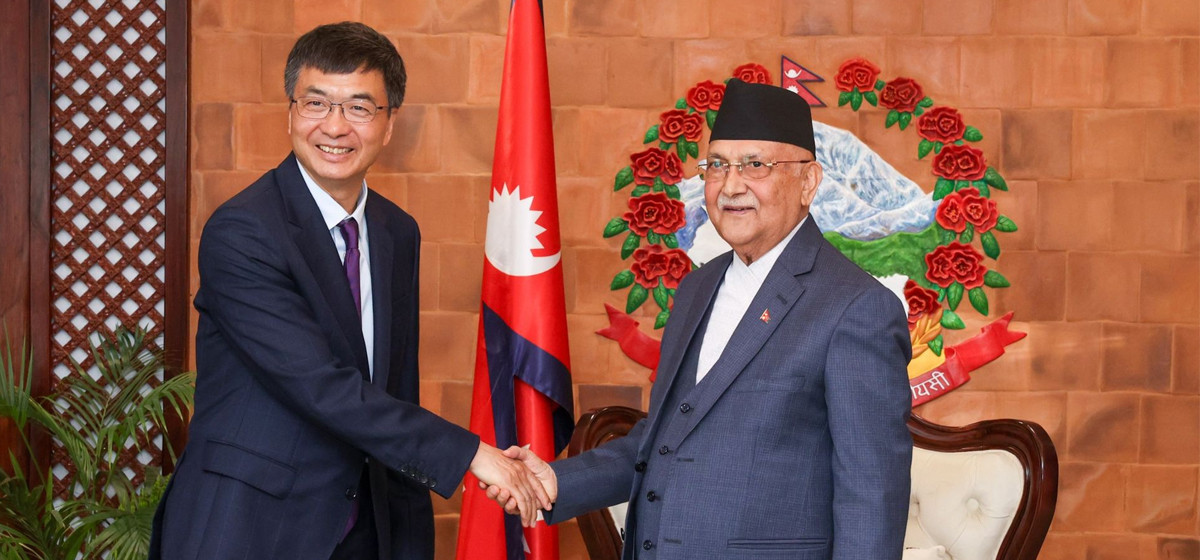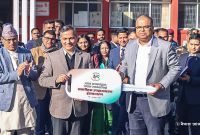PM Oli Vows to Block Anti-China Moves in Nepal: Bold Stand on 'One China' Policy!

Nepal’s Prime Minister, K.P. Sharma Oli, made a significant statement on Sunday, October 20, reaffirming his government's strong adherence to the ‘One China’ policy and firmly declaring that no anti-China activities would be permitted on Nepalese soil. The announcement came during a high-profile meeting with a visiting Chinese delegation led by Chen Jining, a member of the Central Committee of the Communist Party of China (CPC), at Oli’s official residence in Baluwatar, Kathmandu. The event marked a reinforcement of Nepal’s strategic diplomatic stance towards its northern neighbor, China, as the country navigates complex regional dynamics and foreign relations, particularly with respect to its economic and political partnerships.
Oli’s statement underscores Nepal’s unwavering support for China’s territorial integrity, particularly concerning the sensitive issue of Taiwan. The ‘One China’ policy is a cornerstone of Beijing’s diplomatic relations and requires countries maintaining ties with China to recognize Taiwan as an inalienable part of its territory. This policy is critical to China, and any deviation from it is seen as a serious affront to Chinese sovereignty. Oli’s public reiteration of Nepal’s commitment to this policy reaffirms his government's pledge to prevent any groups or individuals from using Nepalese territory for anti-China activities, a position that aligns with Beijing’s broader geopolitical interests in the region.
China has historically been sensitive to activities it perceives as threatening its internal unity, particularly regarding Taiwan, Tibet, and other separatist movements. Nepal, which shares a border with China’s Tibet Autonomous Region, has been under constant diplomatic pressure to prevent activities by Tibetan refugees and other anti-China movements within its borders. By emphasizing that no anti-China activities will be tolerated, Oli has sent a clear message to Beijing that Nepal remains committed to respecting its concerns about territorial integrity and sovereignty.
The visit of the Chinese delegation also provided an opportunity for discussions on broader bilateral issues, including economic cooperation, infrastructure development, and political collaboration between the Communist Party of Nepal (Unified Marxist–Leninist) (CPN-UML) and the CPC. The two parties share a long history of ideological alignment, with Oli often perceived as a pro-China leader due to his advocacy for closer ties with Beijing. During the meeting, Oli expressed his gratitude for China’s ongoing support for Nepal’s economic development and infrastructure projects, particularly under China’s Belt and Road Initiative (BRI), a global development strategy aimed at enhancing regional connectivity and boosting trade.
In addition to economic collaboration, Oli emphasized the importance of maintaining and expanding high-level visits between Nepal and China. These exchanges, he noted, are crucial for deepening government-to-government and people-to-people relations, which have historically been significant for both countries. Such visits also contribute to expanding trade and investment opportunities, key priorities for Nepal as it seeks to accelerate its post-pandemic recovery and foster economic growth.
Oli lauded the role of the CPC and Chinese President Xi Jinping’s leadership in poverty alleviation and comprehensive national development, pointing out how China’s successes could serve as a model for Nepal. He expressed an eagerness to learn from China’s achievements, particularly in terms of economic modernization, poverty reduction, and sustainable development. This reflects Nepal’s aspiration to replicate certain aspects of China’s development trajectory in order to boost its own socio-economic advancement.
The political aspect of the meeting also covered internal dynamics within Nepal. Oli informed the Chinese delegation about the coalition government formed by the CPN-UML and the Nepali Congress, which are Nepal’s two largest political parties. The coalition is seen as a key element in ensuring political stability in the country, which has experienced frequent changes in government in recent years. Oli’s leadership, particularly within the CPN-UML, has been seen as crucial for maintaining this coalition and pushing forward a stable governance agenda.
Chen Jining, on behalf of the Chinese government, reiterated Beijing’s continued support for Nepal’s development and prosperity, stating that China would respect the decisions made by Nepal’s political parties in shaping the country’s future. This comment likely reflects China’s broader non-interference policy in the domestic politics of its allies, provided that these countries adhere to core issues of Chinese foreign policy, such as the ‘One China’ principle.
The meeting was attended by several high-ranking officials from both Nepal and China, including Nepal’s Chief Advisor to the Prime Minister, Bishnu Prasad Rimal, CPN-UML Secretary and Foreign Department Chief Raghubir Mahaseth, and China’s Ambassador to Nepal, Chen Song. The presence of these officials highlighted the importance both countries place on maintaining strong diplomatic ties, particularly during a period of regional geopolitical competition.
In conclusion, Prime Minister Oli’s reaffirmation of Nepal’s commitment to the ‘One China’ policy and his assurance that no anti-China activities will be allowed in Nepal sends a clear message about the Himalayan nation’s foreign policy direction. As Nepal continues to balance its relationships with both China and India, Oli’s stance suggests a careful prioritization of maintaining strong and beneficial ties with Beijing. At the same time, Nepal seeks to navigate its domestic political landscape and achieve sustained economic growth through international cooperation.




![From Kathmandu to the World: How Excel Students Are Winning Big [Admission Open]](https://nepalaaja.com/img/70194/medium/excel-college-info-eng-nep-2342.jpg)
